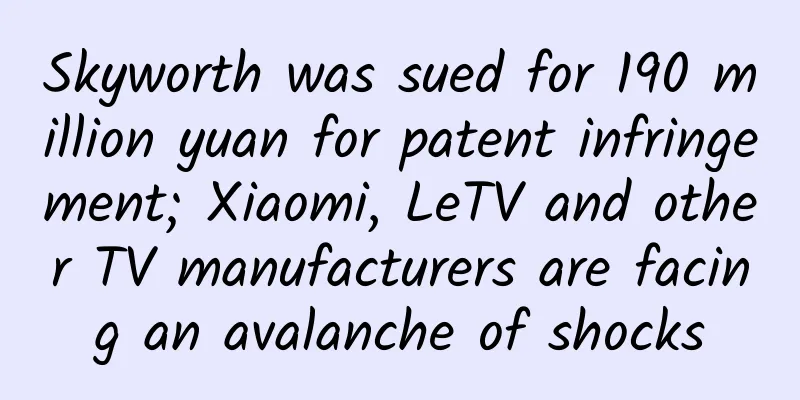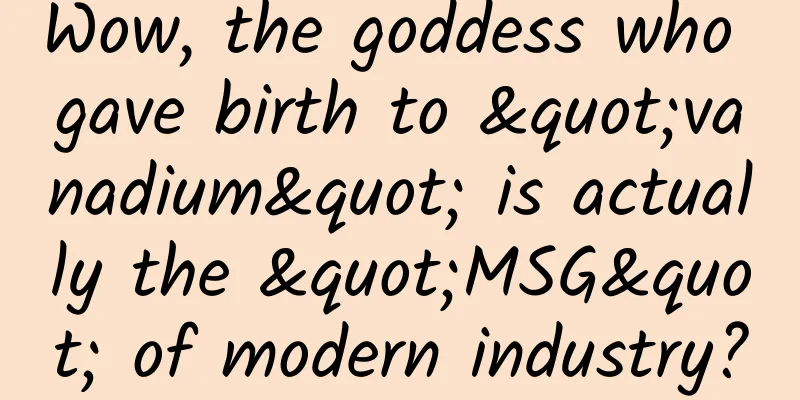Skyworth was sued for 190 million yuan for patent infringement; Xiaomi, LeTV and other TV manufacturers are facing an avalanche of shocks

|
The TV market is experiencing patent "harvesters" similar to those in the mobile phone market. Recently, Guangzhou Guangsheng Digital Technology Co., Ltd. (hereinafter referred to as Guangsheng Company) sued Skyworth Group Co., Ltd. (hereinafter referred to as Skyworth Company), Shenzhen Skyworth-RGB Electronics Co., Ltd. (hereinafter referred to as Skyworth-RGB Company), and Gome Electrical Appliances Co., Ltd. (hereinafter referred to as Gome Company) to the Beijing Intellectual Property Court for suspected patent infringement, claiming that more than 100 Skyworth TVs infringed on two invention patents it held, and requested the court to order the three defendants to stop the infringement and compensate for economic losses and other reasonable expenses totaling 192.2 million yuan. The reason why this case deserves attention is that it is likely to be the first dispute involving standard essential patent licensing in the domestic television field. In the smartphone market, traditional communication giants including Nokia, Qualcomm, and Ericsson still obtain continuous commercial returns in the smartphone market by relying on their accumulated standard essential patents. The direction of the SEP dispute between Guangsheng Company and Innovation Company may, on the one hand, stimulate SEP holders in the TV industry or field to initiate patent applications. On the other hand, in addition to Skyworth, traditional TV manufacturers including Changhong, Hisense, TCL, and Internet TV manufacturers such as Xiaomi, LeTV, Whaley, and Baofeng may become the next targets to be "harvested". A round of patent wars in the TV market is inevitable. Patents involved: Two standard essential patents related to audio decoding Information on file shows that Guangsheng Company is the inventor of DRA multi-channel digital audio encoding and decoding technology, and the two invention patents on which it sued are "audio decoding" and "audio encoding and decoding system". Among them, the "audio decoding" patent was applied for by Guangsheng Company on August 17, 2007 and was approved on May 20, 2009. The patent provides systems, methods and technologies for decoding audio signals from frame-based bit streams and other purposes. The "audio decoding" patent is a standard essential patent for the "Technical Specification for Multi-channel Digital Audio Coding and Decoding" (GB/T 22726-2008) (hereinafter referred to as the DRA standard). The "audio encoding and decoding system" patent was applied for by Guangsheng Company on January 7, 2008, and was approved on September 7, 2011. The patent provides a system, method and technology for encoding an audio signal, wherein a sampled audio signal divided into frames is obtained. The "audio encoding and decoding system" patent involves a method and device for decoding television signals using DRA audio coding. The DRA standard is a mandatory audio standard for the "Frame Structure, Channel Coding and Modulation of Digital Television Terrestrial Broadcasting Transmission System" (GB-20600-2006) (hereinafter referred to as the DTMB standard), and all television products support the DRA standard. Far-reaching impact: may trigger an "avalanche" shock in the domestic TV market Since the patent held by Guangsheng Company is a standard essential patent in the audio field of television products, television products sold in the country cannot bypass its patent. Therefore, the case between Guangsheng Company and Skyworth Company has far-reaching impact. First, the patent licensing fee standard or rate finally confirmed in the case is crucial. At present, the claim amount in the case is 192.2 million yuan. Whether the licensing fee standard is calculated according to a certain proportion or charged according to a fixed amount is still unclear as the case is still under further trial. If the fees are charged at a fixed rate similar to Qualcomm, then high-priced TV products will have to pay more patent licensing fees. Second, the final amount of compensation in this case will affect the strategies of other patent holders. In addition to audio decoding, television products also involve video decoding. The patents held by Guangsheng Company are mainly based on audio decoding technology and do not involve corresponding video decoding. This means that there are still standard essential patent holders in the field of video decoding. Whether Guangsheng Company can win the case and how much compensation it will eventually be awarded will inevitably affect the actions of manufacturers of standard essential patents for video decoding in the field of television products. Third, although Skyworth was the only one sued, other TV manufacturers will not be spared. Currently, only Skyworth has been sued in court, but this does not mean that Changhong, Hisense, TCL, Xiaomi, LeTV, Whaley, Baofeng and other TV manufacturers are relatively safe. Once Skyworth loses the case, these manufacturers will be sued one after another. Therefore, the most important thing for the majority of TV manufacturers at present is to confirm whether Guangsheng’s patent is valid and whether it has fulfilled the corresponding "fair, reasonable and non-discriminatory" licensing commitments as a standard essential patent manufacturer. Otherwise, what awaits them will be a "fierce battle." These patent licensing disputes and conflicts that have repeatedly occurred in the smartphone and TV markets have repeatedly conveyed a common message to relevant manufacturers: only by focusing on original innovation and strengthening patent protection can they take the lead in the fierce market competition. As a winner of Toutiao's Qingyun Plan and Baijiahao's Bai+ Plan, the 2019 Baidu Digital Author of the Year, the Baijiahao's Most Popular Author in the Technology Field, the 2019 Sogou Technology and Culture Author, and the 2021 Baijiahao Quarterly Influential Creator, he has won many awards, including the 2013 Sohu Best Industry Media Person, the 2015 China New Media Entrepreneurship Competition Beijing Third Place, the 2015 Guangmang Experience Award, the 2015 China New Media Entrepreneurship Competition Finals Third Place, and the 2018 Baidu Dynamic Annual Powerful Celebrity. |
<<: She replaced Musk, and the position of Tesla chairman was officially replaced
>>: Is it really enough for Tencent to position itself as an assistant in the smart car industry?
Recommend
Is wild Cordyceps suitable for women?
As you know, many nutrients are not suitable for ...
Benxi SEO Training: Do you know the practical skills of website optimization? How to quickly improve rankings?
Many newcomers to website optimization do not kno...
TV series explained in small pictures: teaching the creation process of film, television and animation commentary copywriting from 0 to 1, 1 million fans in 4 months
Small pictures of TV series: Teaching the creatio...
Shen Xu | You who protects the young
Bullying in schools is not just a children's ...
Real-time updates on the pneumonia epidemic, a real-time summary of the new pneumonia epidemic across the country!
The latest situation of the novel coronavirus pne...
The 200th anniversary of the critical phenomenon. Who first discovered this physical phenomenon?
Commemorates the bicentenary of the discovery of ...
Mobile IM development: technology selection and common problems
[[134897]] I am currently working on an iOS IM SD...
Semiconductors: Global chip sales to reach $526.9 billion in 2023
After chip sales reached a record $574.1 billion ...
Pride and Prejudice: Luo Yonghao's slap in the face and Hammer's return to the ground
Luo Yonghao was slapped in the face again, and th...
67% of American respondents would not consider buying a Tesla, most of whom attribute this to Musk himself
A recent survey shows that 67% of Americans would...
Why is there still dust in my house even though I clean it every day? Where does it come from?
This article was reviewed by Dr. Tao Ning, Associ...
Healthy eating tips for families: Eat to stay healthy and improve immunity
Do you have a low immune system and the flu virus...
Tips for attracting new users on Pinduoduo APP!
This article is an analysis of Pinduoduo's ca...
Mobile terminal ecosystem report: Xiaomi and Apple are eye-catching, while Samsung is bleak
Weibo recently released a smartphone report based...
Frequency band division of wireless technology for the Internet of Things
Wireless communication technologies all need cert...









